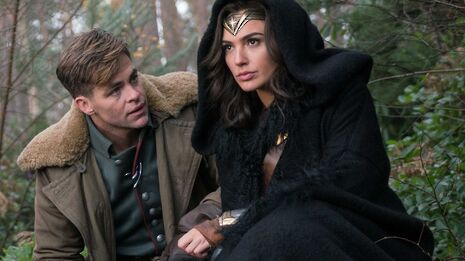Review: Tableaus of ‘Wonder Woman’
The latest addition to the DC canon has largely been applauded; Pany Heliotis contributes a more critical opinion on this popcorn delight of superhero action

And so DC finally solves its portentousness problem. Here she is, Wonder Woman, all civilian naïveté compounded with deific morality; comic foils (3 of them!) and a jar-headed lunkhead of a romantic interest, all presumption of male authority with the intellect and sensitivity to get “woke” halfway through and subordinate himself. If I sound derisive, I’m not trying to be. The trouble and pleasure with Patty Jenkins’s Wonder Woman is its utterly transparent attempt to rouse and appease audiences, at all costs, no matter how heavy-handed.
“These aren’t typical Good vs. Evil action films, but Man vs. Himself Action-psychodramas.”
Let’s not waste time shaking a finger at people surprised by how effective an action film Wonder Woman is because it has been directed by a woman. To remonstrate them is to fail to recognise how little these studio movies like to deviate from house style. Jenkins’s competence as a director is a misnomer in this context. Like Kenneth Branagh on Thor, she is a director-for-hire, having to continue the sepia sheen slow motion established by Zach Snyder in Man of Steel. And boy, is there a lot of slow motion! 25 minutes of Wonder Woman’s runtime can be attributed to pausing on the Amazonian in mid-flight, in graceful pose about to be bring hella-pain to the next proto-nazi in her wake. There’s something rousing about these tableaux of warrior women, defying time and gravity, demanding to be appreciated not for the sexual but for the destructive. Not since Trinity in The Matrix has a female character been allowed to be just as effectively violent as the male, and for it not to feel like an act of erotic sublimation.
Many comparisons have been made between Wonder Woman and Richard Donner’s Superman, but its attempt to channel First World War gothic calls to mind Disney’s The Rocketeer, and, to a lesser extent, the Indiana Jones franchise (I realise that these are Second World War films, but 20 minutes in you’ll realise how irrelevant that is). Jenkins and her creative team regale in the baroque kitsch of Germanic wartime costume, and Elena Anaya’s Dr Maru, all wooden-face (actually part wooden face) especially shines, catching the grotesque camp of a Lon Chaney characterisation. Danny Huston’s General Erich Ludendorff suffers a suspicious lack of backstory, but to a certain extent this is the film’s point.
This current iteration of the DC universe is less concerned with its villains and instead the pervasive evil of human existence. I understand how…what’s the word…pretentious that might sound, but bear with me. Batman vs. Superman focused on its two 'heroes' and turned them into one another’s enemy, locating the potential for malign violence in both of them. Doomsday’s third act entry, though providing a foe for the pair to unite against, is forged from Kryptonian blood – Superman’s own bloodline. Suicide Squad similarly inverts expectation and recalibrates villains as heroes, further reinforcing the notion that the bad guy is in all of us. These aren’t typical Good vs. Evil action films, but Man vs. Himself Action-psychodramas.
Wonder Woman lacks such complexity as a character in herself, hence the comparisons with Donner’s Superman, but the film’s concerns with systemic evil shroud her virtue in darkness. Gal Gadot’s performance is charming and effervescent; her fish-out-of-water curiosity providing laughs over a backdrop of horror. Chris Pine plays second fiddle with modesty, but I couldn’t help but find their romance incidental – a way to get Diana into the human world. Perhaps the sequel will commit wholeheartedly to Wonder Woman as a protagonist on her own, and capitalise on the promise of this first effort.
Wonder Woman is a light-hearted entry in the DC Universe, continuing its fascination with wayward human morality but with added giggles. Hopefully Diana’s next outing will focus less on others’ moral complexity, but her own
 News / Right-wing billionaire Peter Thiel gives ‘antichrist’ lecture in Cambridge6 February 2026
News / Right-wing billionaire Peter Thiel gives ‘antichrist’ lecture in Cambridge6 February 2026 News / Cambridge students uncover possible execution pit9 February 2026
News / Cambridge students uncover possible execution pit9 February 2026 News / Epstein contacted Cambridge academics about research funding6 February 2026
News / Epstein contacted Cambridge academics about research funding6 February 2026 News / Man pleads guility to arson at Catz8 February 2026
News / Man pleads guility to arson at Catz8 February 2026 News / John’s duped into £10m overspend6 February 2026
News / John’s duped into £10m overspend6 February 2026









